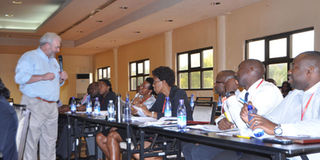Why communication, leadership training is good for your employees

Growth. Anthony Tormey (left), the president and chief executive officer Leadership Development Institute USA trains mid level managers of different companies in communication and leadership at a workshop in Kampala recently. Photo by Stephen Otage
What you need to know:
- Dr Denis Akankunda Bwesigye, the CEO Public Speaking Uganda, who organised the one-day training, observes intrigue in companies and government offices has found space because the leaders lack the skills to lead and make the team bond thereby creating cliques.
Teamwork, excellence, innovation, consumer focus and teamwork are values that every employer wants their employees to uphold. According to Anthony Tormey, the president and chief executive Officer Leadership Development Institute, USA, these values are achievable only if companies invest in training their supervisors in transformational leadership and communication skills whose results trickle down to the teams they lead.
“In a newsroom, if 10 reporters report to an editor who knows how to lead and improve people, he will get 10 times the quality of work he expects from them,” he illustrated during a recent leadership and communications training workshop for mid level managers in Kampala.
Good leader
He says good leaders should be capable of influencing their subordinate’s success by having positive influence over them because this is the way extraordinary leaders are created.
“If you can have positive influence on the people you meet everyday, you are changing their lives. This is the principal for extraordinary leaders. They strive to be of greater success,” he says, adding that this develops the character, competence of working with people and being transformational.
Asked why he thinks this is the case, he says the neuroscience of leadership shows if you understand how your brain works, you will not just react to the environment around you but you will control it leading to the hard and technical skills of leadership. “This is how you are able to manage your time, the events around you, and spare moments in your time, which makes you use your time in the most efficient way.
You are in control of your success, which creates open mindedness to the extent of taking 100 per cent responsibility,” he says.
Asked to explain what he means, he says extraordinary leaders use the power of one to be in charge and the more people embrace their actions that means they have confidence in whatever they are doing and that character tends to trickle down to the subordinates.
Communication
“An effective leader, who communicates well with his people, gets the job done 10 times better because of that significant influence to allow people to fail and are punished for failing,” he says, explaining that allowing people to fail is to allow them to take chances and risks, which results in innovations because this is a way of doing things differently.
“Instead of punishing the subordinate for making mistakes, a good leader engages the subordinate for a conversation to find out why the mistake was made, the lessons learnt, and if the subordinate is ready to change.”
To identify personality characters of the individual team members, he advises that leaders organise team activities such as planning a vacation involving all the team members and that is how you are able to identify task-oriented people; those who just want to get the job done and they do not care about the rest and people-oriented employees.
He says people-oriented employees in most cases after completing an assignment, will always strike a conversation with other team members.
Intrigue
Dr Denis Akankunda Bwesigye, the CEO Public Speaking Uganda, who organised the one-day training, observes intrigue in companies and government offices has found space because the leaders lack the skills to lead and make the team bond thereby creating cliques.
“There is the power of one. Uganda has 42million citizens with one president leading them. “Even in a company, there is one leader for the workers. How to keep them working as a team is very important,” he says, explaining that training exposes aspiring leaders to frameworks which tap into the resourcefulness of all employees.
Bossy
“You can predict and categorise leaders. Some like to hold employees hostage or boss over them, others hold long unproductive meetings because they lack skills of how to lead people in an organised way,” he says explaining that as a leader, the way one communicates to audiences, is instrumental in commanding respect.
“When you get an opportunity to speak to an audience, that is the chance to shine, leave a mark that becomes a brand. You need the skills of how to present to win,” he adds.
Depending on one’s professional background, public speaking instils skills for coercion, persuasion and gives the leaders confidence to communicate the message with clarity.




